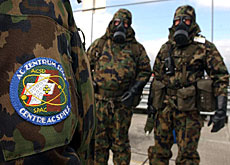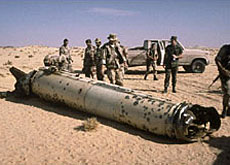Swiss train Greeks for Olympic chemical attacks

The defence ministry says it has trained Greek chemical weapons experts to respond to any attacks during this summer’s Olympic Games.
Swiss officials said on Monday that the government was also sending chemical protection equipment to the Greek capital, Athens.
The Spiez Laboratory, which specialises in protection from nuclear, biological and chemical weapons, said the material would enable the Greeks to intervene quickly in the event of a threat or an attack.
Spokesman Bernard Jeanty said the equipment would be sufficient to protect the 18-strong Greek unit but not the general public.
Jeanty said the Greek specialists had been trained to analyse the type of chemical weapon used in an attack as quickly as possible.
He described it as Switzerland’s small contribution to the huge security operation being put in place for the Olympics, which get underway in August.
Security plan
Earlier this month, Greece unveiled a massive $2 billion (SFr2.5 billion) security plan. The police will be joined by the army, navy and air force to thwart potential terrorist attacks.
The Greek military has vowed to shoot down any planes that ignore no-fly zones over the city.
And athletes are to receive what the Greek authorities promise will be round the clock protection.
As part of Nato’s Partnership for Peace programme, the Spiez Laboratory supports other countries in the implementation of the 1997 Chemical Weapons Convention.
Since 1998, around 400 specialists from nearly 90 countries have undergone training in Spiez.
swissinfo with agencies
The Spiez Laboratory specialises in protection against nuclear, biological and chemical weapons.
It was founded in 1925 and now employs 98 people.
It has an annual budget of SFr20 million.

In compliance with the JTI standards
More: SWI swissinfo.ch certified by the Journalism Trust Initiative










You can find an overview of ongoing debates with our journalists here . Please join us!
If you want to start a conversation about a topic raised in this article or want to report factual errors, email us at english@swissinfo.ch.